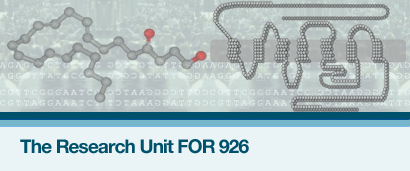SP 3
Univ.-Prof. Dr. sc. nat. Beat Lutz
Institute of Physiological Chemistry
University Medical Center
of the Johannes Gutenberg-University Mainz
Duesbergweg 6, 55128 Mainz
Phone: +49 (0)6131 39 25912
Fax: +49 (0)6131 39 23536
E-mail: blutz@uni-mainz.de
Homepage Institute of Physiological Chemistry
Dr. rer. nat. Krisztina Monory
Institute of Physiological Chemistry
University Medical Center
of the Johannes Gutenberg-University Mainz
Duesbergweg 6, 55128 Mainz
Phone: +49 (0)6131 39 24551
Fax: +49 (0)6131 39 23536
E-mail: monory@uni-mainz.de
 CV Lutz
(225KB)
CV Lutz
(225KB)
Characterization of cell type-specific endocannabinoid signaling at biochemical and behavioral level
SP3 aimed at understanding the dynamics of the activity status of the ECS in the adult mouse brain, particularly in endocannabinoid-controlled behaviors.
During the first years of funding, we established a genetic tool that allows the conditional overexpression of several members of the ECS in a cell type-specific- manner, namely of CB1 receptors, MAGL, FAAH and DAGL. This system, which is based on recombinant adeno-associated virus (AAV) injected into Cre recombinase-expressing mouse lines of interest, will be very useful to shed new light on the molecular mechanisms underlying endocannabinoid function in physiology and disease state.
In this subproject we also investigated the possibility of modifying the ECS by changing the diet of animals. Indeed, our experiments clearly showed that diet-induced obesity is able to change fundamental hippocampal synaptic processes, which are mediated by endocannabinoids.
For the next funding period, SP3 will analyze the physiological role of CB1 receptors on serotonergic neurons using a novel serotonergic cell-specific CB1 receptor conditional mutant mouse line. We will focus on the analysis of the metabolic phenotype and the anxiety/sociability phenotypes. In a complementary project, we put forward the hypothesis that the CB1 receptor and DAGL represent two important hub proteins in a network of protein signaling systems. Since CB1 receptor conveys differential functions depending on the neuronal subpopulation where it is expressed, complexes will be characterized in the two major neuronal classes, i.e. glutamatergic and GABAergic neurons, and additionally in serotonergic neurons. This approach wishes to obtain a better understanding of cell type-specific endocannabinoid signaling.
Team members:
Stephan Guggenhuber
Phone: +49 (0)6131 39-22192
Fax: +49 (0)6131 39-23536
E-mail: guggenhuber@uni-mainz.de
Vanessa Enk
E-mail: enk@uni-mainz.de



